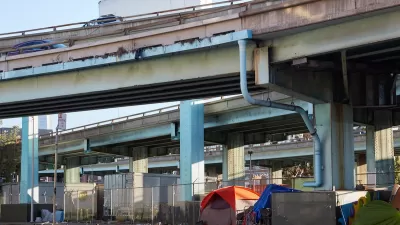Periodically in the affordable housing world, a few of us acknowledge that the vast majority of low-income people live in unsubsidized rentals in one- to four-unit buildings, and we wonder how to preserve and improve those units. Here is a way.
How does one go about working with landlords, often who own only a few units, to keep their units up to code and affordable?
The conversations I've heard on how to do this have mostly focused on the financing and capital investments side, but a panel I attended about rapid rehousing last week at the National Alliance to End Homelessness conference made me wonder about support on the operations side as well.
Rapid rehousing is part of the growing housing-first approach to homelessness, which stipulates that stable housing is the first step toward dealing with homelessness, not the last. A rapid rehousing program helps with housing location, provides financial assistance for a short period of time (often four to six months), and case management. They tend to be run by nonprofits, using a combination of public and private funding.
Why would a landlord want to work with such a program, especially since the rents are generally limited to the fair market rent?
The presenters (Zachary Brown, WV Coalition to End Homelessness; Ben Catell Noll, Friendship Place; Beth Fetzer-Rice, Salvation Army in Central Ohio; and Michael Shore, HOM Inc) had a number of potential answers. Along with giving the feeling of doing something good and being part of something larger (which they absolutely worked), they said . . .
FULL STORY: Could an Anti-Homelessness Program Stabilize Affordable Housing?

Maui's Vacation Rental Debate Turns Ugly
Verbal attacks, misinformation campaigns and fistfights plague a high-stakes debate to convert thousands of vacation rentals into long-term housing.

Planetizen Federal Action Tracker
A weekly monitor of how Trump’s orders and actions are impacting planners and planning in America.

In Urban Planning, AI Prompting Could be the New Design Thinking
Creativity has long been key to great urban design. What if we see AI as our new creative partner?

Baker Creek Pavilion: Blending Nature and Architecture in Knoxville
Knoxville’s urban wilderness planning initiative unveils the "Baker Creek Pavilion" to increase the city's access to green spaces.

Pedestrian Deaths Drop, Remain Twice as High as in 2009
Fatalities declined by 4 percent in 2024, but the U.S. is still nowhere close to ‘Vision Zero.’

King County Supportive Housing Program Offers Hope for Unhoused Residents
The county is taking a ‘Housing First’ approach that prioritizes getting people into housing, then offering wraparound supportive services.
Urban Design for Planners 1: Software Tools
This six-course series explores essential urban design concepts using open source software and equips planners with the tools they need to participate fully in the urban design process.
Planning for Universal Design
Learn the tools for implementing Universal Design in planning regulations.
planning NEXT
Appalachian Highlands Housing Partners
Mpact (founded as Rail~Volution)
City of Camden Redevelopment Agency
City of Astoria
City of Portland
City of Laramie





























